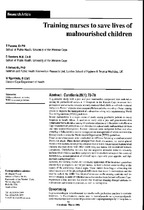Training nurses to save lives of malnourished children

View/
Date
2006Author
Puoane, Thandi
Sanders, David
Ashworth, Ann
Ngumbela, Modesta
Metadata
Show full item recordAbstract
A qualitative study with a pre- and post-intervention component was undertaken among 66 professional nurses at 11 hospitals in the Eastern Cape to assess their perceptions and attitudes towards severely malnourished children and their mothers/caregivers. Nurses’ attitudes were compared before and after attending a 5-day training course to improve the management of malnutrition along with implementing World Health Organization (WHO) guidelines. Severe malnutrition is a major cause of death among paediatric patients in many hospitals in South Africa. A qualitative study with a pre- and post-intervention component was undertaken among 66 professional nurses at 11 hospitals in the Eastern Cape to assess their perceptions and attitudes towards severely malnourished children and their mothers/caregivers. Nurses’ attitudes were compared before and after attending a 5-day training course to improve the management of malnutrition along with implementing World Health Organization (WHO) guidelines. Focus group discussions were conducted in isiXhosa following a semi-structured discussion guide. Three themes emerged from these discussions, i.e. blame was placed on the mothers for not giving adequate care, malnourished children were valued less than those with other conditions, and resentment that nurses felt towards caregivers. underlying reasons for negative attitudes towards severely malnourished children and their caregivers were misunderstandings of the causes of severe malnutrition, misinterpretation of clinical signs,especially poor appetite and and high mortality during treatment.However, successful application of the treatment guidelines altered these perceptions and helped nurses to have a better understanding of the causes of the presenting clinical signs. These nurses have begun advocating for raised awareness and the need to include the WHO Ten Steps of treatment in the nursing curricula and in-service training. A cadre of volunteer nurse-trainers has been formed in Eastern Cape. Experience in this province has shown that in-service training changes attitudes to malnutrition and treatment practices, as well as saving lives.
